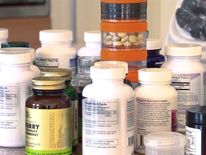http://news.sky.com/story/call-to-test-long-term-safety-of-brain-boosting-smart-drugs-10557681
A new generation of substances which aid concentration and memory are rising in popularity, but their long-term impact is unknown.
Cognitive enhancing drugs, also known as "nootropics" or "smart drugs", could have real benefits for people like doctors, military personnel, air traffic controllers and shift workers if trials were brought in to ensure long-term safety, according to a prominent scientist.
"Nootropics" is the buzzword for a new generation of substances taken to make users think faster, remember for longer and concentrate harder.
They have previously been associated with high-performing Silicon Valley tech entrepreneurs trying to get an all-important competitive edge, or with university students cramming for exams.
Barbara J Sahakian, a professor of clinical neuropsychology who studies the effects of cognitive enhancing drugs on the brain, told Sky News: "We could do with better drugs for people who really do have to stay awake and alert, for instance, in the military.
"So long as they are safe in the long-term for healthy people to use, and if they are demonstrated to be effective, that would be good - but we don't have as yet these long-term safety studies."
The term "nootropics" is a fairly generic one and could technically cover anything that enhances cognitive function - including caffeine, medicines such as Modafinil, or psychedelics.
Sadie Scott, a mother-of-two who owns three businesses, takes a number of legal and mainly naturally-derived nootropics to enhance her mental performance.
She has a kitchen cupboard full of different supplements and decides which ones she feels like taking on a day-to-day basis, depending on what cognitive effects she wants to achieve.
Ms Scott only buys from websites or outlets she trusts.
"I really read up on stuff, I'm not just going to randomly take products ... especially if you are messing with your neurochemistry," she added.
Sadie Scott has a kitchen cupboard full of 'nootropics' to aid her memory
It is hard to know officially how many people take nootropics, but go online and you'll find forums and podcasts devoted to discussing them.
Jesse Lawler, who hosts the US-based Smart Drug Smarts podcast, says his listeners are not just looking to push their brains up a gear - they want mental preservation, too.
He added: "They've seen their parents who've maybe had Alzheimer's, had senile dementia (and) kind of seen what the last decades of life can be like as far as a cognitive downslope and so they're very anxious to make sure 'I saw what happened to my parents, I want to make sure that doesn't happen to me'."
But identifying the legal status of some smart drugs can be confusing at best, and due to the often unregulated or underground nature of buying and consuming nootropics, most fans get theirs online - which means customers can rarely be certain of authenticity.
The Medicines & Healthcare Products Regulatory Agency carries out Operation Pangea every year, which looks at the types of medicines coming into the UK from unregulated sources.
The head of enforcement at the agency, Alistair Jeffrey, says he has seen a rise in nootropics over the last few years - and warned buying unlicensed drugs online is "very dangerous".
He added: "If you think you're going to go online and get a genuine medicine you may well not be - it could be something completely different."

Комментариев нет:
Отправить комментарий